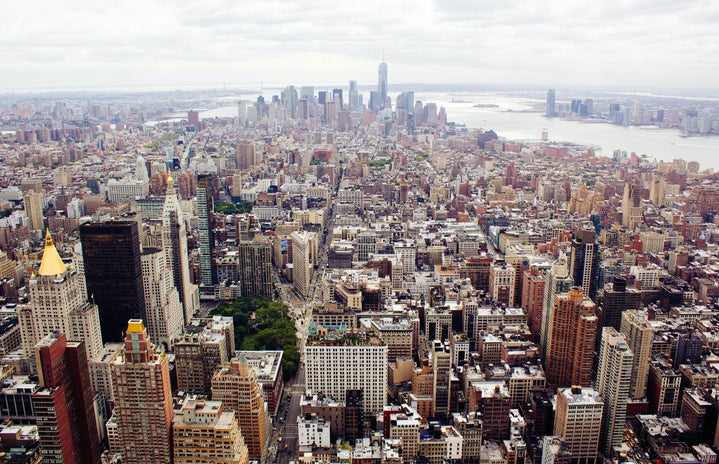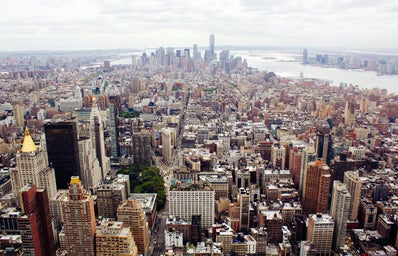How often do you watch a program presenting a person who mostly complains about things that irritate them, and talks about the things that inspire them? For me, this is rarely – but it sounds like a dream job if only, of course, you have lived a long, interesting enough life. A month ago, Netflix released a seven-part documentary Pretend It’s a City directed by Martin Scorsese and starring Fran Lebowitz – an iconic American humorist and writer who lives in New York. It revolves around Lebowitz, then sixty-nine years old, and her life in one of the biggest and most culturally rich cities in the world to which she has an amusing, what seems like, love-hate relationship. She discusses with Scorsese, or complains and contemplates, different topics – New York, talent, money, health, the arts and reading are among them. New York, of course, has everything to offer but there is one problem… Lebowitz’s contempt for her fellow man. Talk about a difficult relationship.
The name – fitting as you will hear if you watch it – comes from the very first episode which starts with Lebowitz taking an audience question: “Speaking of people in the street, does it bother you when people stop in the middle, in the flow of traffic, and look at their maps…”, and Lebowitz interrupts by raising her hand as if indicating “don’t even get me started because there will not be time to answer this”. So, the answer is obvious, and she goes on to say that she should write a manifesto with the title Pretend It’s a City – an advice to the people of, or just in, New York which meaning – a bit later clarified – is that actually look up and around you; be attentive to how and where you are going. Lebowitz, throughout episodes, is also shown walking around the big city and, suitably, one of the first things she gives her opinion about is how “New Yorkers have forgotten how to walk.” Now it is perfectly funny if you do not make the mistake of taking her entirely seriously. Right from the beginning, then, I was really intrigued because not only was this hilarious, to a certain extent I can identify with this trait of complaining about the littlest things and so, I was interested in what Fran Lebowitz had to say.
Of course, someone like me, for example, here in the other side of the world and about fifty years younger living in a smaller boring city, could not benefit any more from the series than just being entertained. I did not think anything would strike me particularly. This is an old school New Yorker woman who is very frank and direct – sometimes brutally honest – and firm in her opinions and views. She does not believe, for example, that a good writer loves to write; if you love to write, you’re a bad writer. (As I’m writing this, I’m thinking about myself and grinning for I could very well be one of those talentless ones. Although, she was talking about this element of having to truly get inside yourself while you write, which is not always pleasant in terms of contemplation.) She is not the most sympathetic towards others’ opinions. Lebowitz has lived in New York since 1969 and says in one episode that she still has the same habits as she had in the seventies and finds many aspects of the current world frustrating. She is also honest about her position as a gay woman, saying that she should not be considered a gay rights activist (a misconception from the younger generation) and hasn’t been the most active feminist – in terms of seeing the MeToo movement coming which she could not imagine – but states that she always “believes these women” without a doubt.
But there is another perspective from which to look at her. She was born in 1950 and moved to New York in late sixties, close to the seventies, and herself struggled while trying to become a writer, with jobs where she would not have felt unsafe. She witnessed the remarkable societal and cultural changes happening during the second half of the twentieth century and was discovered and developed as a witty cultural commentator who, at the time of filming the documentary, has read about and owns ten thousand books. (Yes, you read that correctly.) As a writer, she also got into the notable circle of New York artists. In the series, you get those moments where she is very honest about herself as a person as well, but with humor; for example, her unsuccess in academia; significantly long writer’s block; financial problems; and is perfectly aware that people are sometimes “infuriated” by her. But she owns these characteristics and at the time of the documentary can be viewed, then, as a humorist and a public speaker who is still wanted to be heard. Some of her frankness – developed in these past fifty decades – can be learned from. And her stories! They make the documentary worthwhile.
Though an old school New Yorker, her directness, then – while also amusing – presents interesting points as she has lived a long life in one of the most difficult and hectic cities in the world. Of course, because of the internet, the whole world is now a hectic space of nonsense and absolute rubbish that occasionally is too available for us in our twenties who might browse and search things online a bit more than needed – seeing and reading things that seem incredibly stupid and unnecessary. Lebowitz’s directness, though, can be benefited from whether you agree with her or not because she inspires to think for ourselves and actually contemplate what is worth our time and attention – our interest and our discontent. You may not agree with her opinions, especially if you think that she just complains a lot as a woman of the old-generation who does not entirely like the modern world and being with people too much; nevertheless, her comedic frankness can be seen as another perspective and perhaps even encouraging for tuning out the unnecessary and silliness of contemporary culture – the trends, beliefs, the useless, overly critical people on the internet, the excessive need to go above and beyond in one’s goals and so forth. Here are some of Lebowitz’s thoughts from the series that particularly caught my attention; some of them just quickly presented opinions and some more thoroughly discussed:
“How would you describe your lifestyle?”, someone asks her, to which she answers: “Let me assure you, I would never use the word ‘lifestyle’. That’s pretty much how I would describe it.” I found this funny. Why should you think of having a lifestyle? Is this not, in a way restricting? Does it not, unconsciously, create certain expectations for yourself? Perhaps unattainable goals, especially since some people are glued to their phones and follow these “influencers” that painstakingly promote life… styles?
As a public figure who often shares her views and opinions, she finds people being infuriated by her which, then, is surprising: “So what? Who am I; am I making decisions for you? It’s not like I’m in charge of anything.” It does not take a genius to understand that public figures do not have to be taken seriously, especially if they are not in position to make changes. Of course, Lebowitz is an angry woman, but she knows that she cannot change things she is angry about. “The anger is: I have no power. But I’m filled with opinions.” Not all opinions are good, certainly, but I find, as thinking about her words, that if you’re not angry, you’re not paying attention to what is going on around you socially.
Lebowitz can also be a harsh critic – towards herself and others – and it is seen in her opinion on talent. Here’s a quote from the documentary:
“The main thing writers need – or painters or any other kind of artist – is talent. And the great thing about talent is that it is the one thing, the only thing I can think of, that is absolutely, randomly distributed throughout the population of the world. It has nothing to do with anything. You cannot buy it, you cannot learn it – you know – you cannot inherit it. You can’t. It’s not genetic. Okay? It is just sprinkled like sand around the world, and it could come up anywhere.”
And if you’re bad at something but love doing it, “keep it to yourself. Do not share this,” she says semi firmly. Many people can’t achieve greatness but if you can show something that is better than what has already been shown – than “most things people show to the world,” she sees it as acceptable. I agree to this to the extent that people who for some reason are passionate about seriously sharing their amateur hobbies, perhaps are better off keeping them private.
Scorsese asks which art form is the most wanting at this point, in terms of looking at culture now. Lebowitz asks for clarification, as in, which is the worst or “which has the most opportunity for chicanery” (artful trickery or nonsense); to which she answers, “the visual arts”: “It’s quite a racket.” This is in reference to art auctions that have come to highlight “the prices”. She gives an example of an auction with a Picasso painting: “… out comes the Picasso, dead silence. Once the hammer comes down on the price, applause. Okay? So we live in a world where they applaud the price but not the Picasso. I rest my case.” I could not stop laughing at this.
Considering pleasures, an interviewer asks Lebowitz if she has a guilty pleasure. She answers:
“No. I have no guilty pleasures because pleasure never makes me feel guilty. I think it’s unbelievable that there’s such a phrase as ‘guilty pleasure’. In other words… Unless your pleasure is killing people. … My pleasures are absolutely benign, by which I mean no one dies, okay? … And I think, ‘No, I don’t feel guilty for having pleasure’.”
She wonders what is there to feel guilty about. The “enjoyment of some form that is not high art”? And here she shows bit of a sympathetic side: “… if I ask, ‘Why do you do that?’ If they say, ‘I think it’s fun’, that’s, to me, a good answer.” A bad answer is trying to make profound justifications or excuses, which I agree with and found really funny.
When it comes to books and reading, in which she excels, she values these things immensely. To her, reading became a door into a bigger world. Therefore, she never thought of questions like “Can I see myself in this book?”.
“The second I learned how to read… it was unbelievable to me. Like the world became … my world became a billion times bigger. That used to be the point of reading, in a way. Now it’s not. Now people are always saying, … ‘There’s no books about people like me. I don’t see myself in the book’.”
“A book isn’t supposed to be a mirror. It’s supposed to be a door!”
This made me really wonder what I myself think. It is beautiful when many more groups can see themselves in a fictional story because we still love and value stories and can be extremely entertained and affected by them. But, to be honest, I found myself also thinking that literature has mostly been a “door” for me which contented me because I want to learn and become more sympathetic as a person.
Now, my effort to present this funny miniseries does not do justice to its actual entertaining content. Fran Lebowitz talks of many topics (and puts actual effort into her complaints) and turns out a fascinating person, representing the Old New York mindset which can be seen historically important in terms of culture. She talks with Alec Baldwin and Spike Lee, for instance, about very amusing topics which are worth listening to because of Lebowitz’s way of explaining her opinions with actual thought while they may come off as complaints. One does not have to be sympathetic; that has not been my goal. But I myself found the documentary, along with entertaining, also educational when it comes to conversation – and no, I’m not being sarcastic given that, yes, she complains a lot. She is very well-read, very aware of her surroundings – of the modern New York – even though she sometimes reacts negatively towards them, and brings a lot of humor into her talk that I found delightful.
Here’s an interview from The New Yorker with Lebowitz, published in last year’s April, where she is interviewed about Covid and how she adapted while NY became the epicenter. Although, I would encourage to first see the miniseries which isn’t that long:
https://www.newyorker.com/culture/the-new-yorker-interview/fran-lebowitz-is-never-leaving-new-york
This article was edited February 9th 2021 with small changes for clarification.


